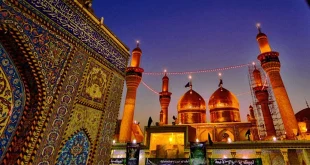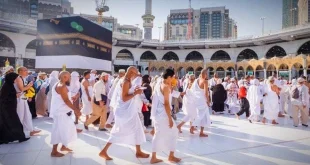The Islamic Republic's support is based on Islamic jurisprudence and Islamic law, rather than tactical moves or diplomatic issues," said Ayatollah Khamenei in a meeting with Ismail Haniyeh on...
Read More »Key Terms of the Qur’an: A Critical Dictionary
This book provides detailed and multidisciplinary coverage of a wealth of key Qur’anic terms, with incisive entries on crucial expressions ranging from the divine names allāh (“God”) and al-raḥmān (“the Merciful”) to the Qur’anic understanding of belief and self-surrender to.....
Read More »Social and Political Life of Imam al-Jawad (A)
Imam Muhammad Taqi (AS), better known as Al-Jawad (AS) (‘The Generous’), was born in Medina in 811 AD. He was killed by the Abbasid Caliph in Baghdad in 835 AD. He was the Imam for...
Read More »Imam al-Jawad’s (A) Virtues Were Acknowledged by Friends and Foes Alike
Imam Jawad (a.s.) taught us a great lesson. That great lesson is that when faced with hypocritical and duplicitous powers, we should make an attempt to awaken people’s awareness for fighting these...
Read More »Values and Meanings in Hajj’s Rites
Hajj is a collection of rites and observances. It is a number of action and recitation. They are all combined to be performed within a certain time and place. The result is worship, and an enlightening action conducive to the building up of the Muslim character. It effectively rebuilds the....
Read More »Al-Azhar Sheikh Slam Silence of the International Community on the Palestinian Rights
I am deeply saddened by the silence of the international community regarding the rights of the Palestinian people and the repeated attacks on Islamic and Christian holy sites,” said the grand imam of...
Read More »A Clear Explanation for the Prohibition of Music
The verdict on listening to music might be unclear and confusing to many Muslims. So our goal in these articles is to make a clear explanation on case 20 in the second volume of “Minhaj Al-Salehin” According to the verdict of...
Read More »Ayatollah Sistani’s Epic Fatwa against Daesh in Iraq
A day after the Speicher massacre, the bereaved nation was addressed by Ayatollah Ali Sistani, who commands tremendous respect from all sections of Iraqi society.During a Friday prayer in the holy city of Karbala, the fatwa was issued on his behalf calling on all Iraqi citizens to defend the...
Read More »Can a Person Borrow Money to Go to Hajj?
A person who can perform Hajj by borrowing money is not able to perform Hajj, even if he can pay later his whole debt at once or by installments, unless he has assets that can pay his debt from them....
Read More »Call for Papers: Islam and the Discourse of Enlightenment
The Journal of ‘Contemporary Study of Islam’ (JCSI) is delighted to invite researchers and scholars to submit their papers in a special issue of the Journal on the topic of ‘Islam and the Discourse of...
Read More » Ijtihad Network Being Wise and Faithful Muslim in the Contemporary World
Ijtihad Network Being Wise and Faithful Muslim in the Contemporary World









